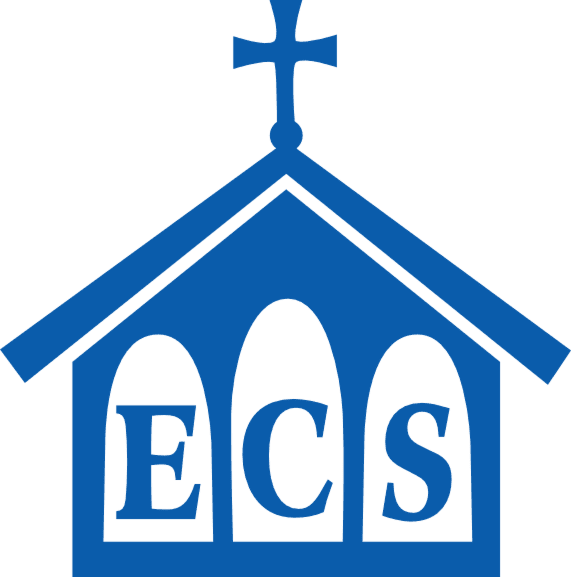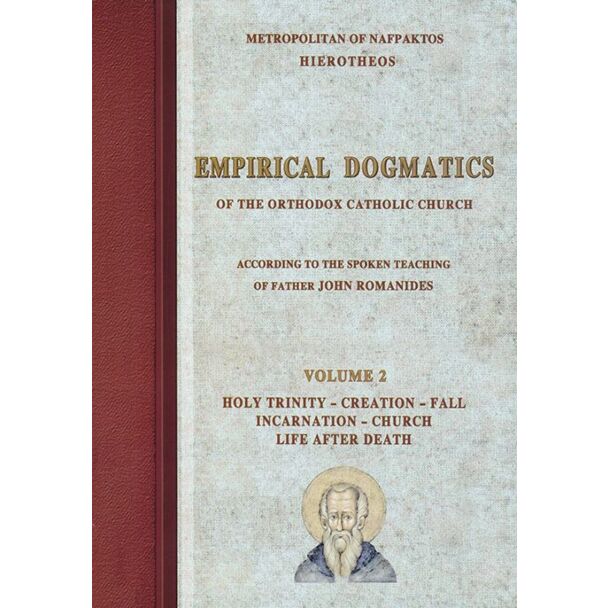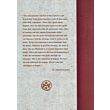Empirical Dogmatics of the Orthodox Catholic Church according to the Spoken Teaching of Father John Romanides, Volume 2: Holy Trinity – Creation – Fall – Incarnation – Church – Life After Death; Critical Presentation
Metropolitan of Nafpaktos Hierotheos
Translated by Sister Pelagia Selfe
Editor: Effie Mavromichali
Translated by Sister Pelagia Selfe
Editor: Effie Mavromichali
Publication Data: Levadia, Greece: Birth of the Theotokos Monastery, 2013
Format: softcover
Number of Pages: 472
Dimensions (l × w × h): 24.0 cm × 16.8 cm × 2.5 cm
Additional Information: full-color illustrations
ISBN: 978‒960‒7070‒81‒4
Metropolitan of Nafpaktos Hierotheos
Translated by Sister Pelagia Selfe
Editor: Effie Mavromichali
Volume 2 of Empirical Dogmatics of the Orthodox Catholic Church according to the Spoken Teaching of Father John Romanides
“In the present book particular issues are addressed, such as the theology of the Holy Trinity, the creation of the world, the Fall of man, the incarnation of the Word, the Church as the Body of Christ and a communion of glorification, and life after death. It should be noted that a full dogmatic analysis of these subjects according to the whole tradition of the Church is not undertaken, but these dogmatic issues will be emphasised from the point of view of experience. That is to say, they are linked with the empirical knowledge that can be gained of them. In particular, there is an analysis of how dogmas are the fruit of the experience of divine vision granted to the Prophets, Apostles and Fathers, and how dogmas are subsequently converted into personal experience, becoming blood and nourishment for our spiritual organism. The basis of all the analyses is that the God-seeing Prophets, Apostles and Fathers have authentic and direct knowledge of God, and we who accept them and follow them have indirect knowledge of God. We can, however, if we really live within the Church, acquire direct knowledge of God.”
—“Preface to the Greek Edition”
CONTENTS
Preface to the Greek Edition
Introduction
Note by the Author
Part 1
Theology of the Holy Trinity
1. Dogma and Mystery of the Holy Trinity
a) The Existence of God
i. The Unincarnate Word
ii. The Angel of Great Counsel
b) Knowledge of God – Theology
c) Formulating Experience – Dogma
2. Persons, Essence and Energy
a) Triune God in the Old Testament
b) Persons – Essence – Energy
c) Manner of Existence of the Persons of the Holy Trinity
d) The Son and the Holy Spirit Co-essential with the Father
3. Created and Uncreated
a) The Difference between Created and Uncreated
b) The Bridge between Created and Uncreated
c) Theoria (Vision) of the Uncreated Glory of the Holy Trinity
Part 2
The Creation of the World
1. The Creation of the Universe
a) God the Creator
b) Created Things
c) The Purpose of Creation
d) The Energy of God in Nature
e) Recording the Experience of Revelation
2. The Creation of Angels
a) Angels of Light
b) Demons of Darkness
3. The Creation of Man
a) The Creation of Man in the Image and Likeness of God
b) The Simultaneous Creation of Body and Soul
c) The Human Soul
i. Rational and Noetic Faculties (Energies)
ii. Reason and Nous
iii. The Noetic Faculty in relation to Passions, Rational Faculty and Environment
iv. Rational and Noetic Worship
d) The Human Body
Part 3
The Fall of Man
1. The Life of the First-Formed Human Beings before the Fall
2. Ancestral Sin
3. Consequences of the Fall
4. Inheriting Sin
5. Old and New Adam
Part 4
The Incarnation of the Son and Word of God
1. Empirical Facts
2. Christ-Messiah
3. The Birth and Baptism of Christ
4. The Revelation of the Uncreated Energies of Christ
5. The Mystery of the Cross and Resurrection of Christ
Part 5
The Church as the Body of Christ and a Community of Glorification
1. Uncreated and Created Church
2. The Mystery of Pentecost
3. The One, Holy, Catholic and Apostolic Church
4. The Purpose of the Church
5. The Spiritual Perfecting of Christians
a) Servant, Hired Worker, Son
b) Purification, Illumination, Glorification
i. Ecclesiastical Interpretation of the Stages of Spiritual Perfection
ii. Definition of Purification
iii. Definition of Illumination of the Nous
iv. Definition of Glorification
c) The Glorified as the Foundation of Ecclesiastical Life
6. The Mysteries (Sacraments) of the Church
a) Unity of the Mysteries
b) The Mystery of Baptism
c) The Mystery of Chrismation
d) The Mystery of the Divine Liturgy
e) Clergy, Monks and Laity
7. Heresies and Councils
a) Heresies
i. What is heresy?
ii. The Difference between the Orthodox and Heretics
iii. Dialogues between the Orthodox Church and other Confessions
b) Councils of the Church
i. Local and Ecumenical Councils
ii. Orthodox Preconditions for Councils
iii. The Dogmatic Statements and Canons of the Councils
iv. Condemnation of Heretics
8. Atheism, Religion, Church
Part 6
Life after Death
1. The Death of Man
2. The Intermediate State of Souls
3. Paradise and Hell
4. The Cure of Man
Central Points in the Teaching of Fr. John Romanides
Instead of an Epilogue
Format: softcover
Number of Pages: 472
Dimensions (l × w × h): 24.0 cm × 16.8 cm × 2.5 cm
Additional Information: full-color illustrations
ISBN: 978‒960‒7070‒81‒4
Metropolitan of Nafpaktos Hierotheos
Translated by Sister Pelagia Selfe
Editor: Effie Mavromichali
Volume 2 of Empirical Dogmatics of the Orthodox Catholic Church according to the Spoken Teaching of Father John Romanides
“In the present book particular issues are addressed, such as the theology of the Holy Trinity, the creation of the world, the Fall of man, the incarnation of the Word, the Church as the Body of Christ and a communion of glorification, and life after death. It should be noted that a full dogmatic analysis of these subjects according to the whole tradition of the Church is not undertaken, but these dogmatic issues will be emphasised from the point of view of experience. That is to say, they are linked with the empirical knowledge that can be gained of them. In particular, there is an analysis of how dogmas are the fruit of the experience of divine vision granted to the Prophets, Apostles and Fathers, and how dogmas are subsequently converted into personal experience, becoming blood and nourishment for our spiritual organism. The basis of all the analyses is that the God-seeing Prophets, Apostles and Fathers have authentic and direct knowledge of God, and we who accept them and follow them have indirect knowledge of God. We can, however, if we really live within the Church, acquire direct knowledge of God.”
—“Preface to the Greek Edition”
CONTENTS
Preface to the Greek Edition
Introduction
Note by the Author
Part 1
Theology of the Holy Trinity
1. Dogma and Mystery of the Holy Trinity
a) The Existence of God
i. The Unincarnate Word
ii. The Angel of Great Counsel
b) Knowledge of God – Theology
c) Formulating Experience – Dogma
2. Persons, Essence and Energy
a) Triune God in the Old Testament
b) Persons – Essence – Energy
c) Manner of Existence of the Persons of the Holy Trinity
d) The Son and the Holy Spirit Co-essential with the Father
3. Created and Uncreated
a) The Difference between Created and Uncreated
b) The Bridge between Created and Uncreated
c) Theoria (Vision) of the Uncreated Glory of the Holy Trinity
Part 2
The Creation of the World
1. The Creation of the Universe
a) God the Creator
b) Created Things
c) The Purpose of Creation
d) The Energy of God in Nature
e) Recording the Experience of Revelation
2. The Creation of Angels
a) Angels of Light
b) Demons of Darkness
3. The Creation of Man
a) The Creation of Man in the Image and Likeness of God
b) The Simultaneous Creation of Body and Soul
c) The Human Soul
i. Rational and Noetic Faculties (Energies)
ii. Reason and Nous
iii. The Noetic Faculty in relation to Passions, Rational Faculty and Environment
iv. Rational and Noetic Worship
d) The Human Body
Part 3
The Fall of Man
1. The Life of the First-Formed Human Beings before the Fall
2. Ancestral Sin
3. Consequences of the Fall
4. Inheriting Sin
5. Old and New Adam
Part 4
The Incarnation of the Son and Word of God
1. Empirical Facts
2. Christ-Messiah
3. The Birth and Baptism of Christ
4. The Revelation of the Uncreated Energies of Christ
5. The Mystery of the Cross and Resurrection of Christ
Part 5
The Church as the Body of Christ and a Community of Glorification
1. Uncreated and Created Church
2. The Mystery of Pentecost
3. The One, Holy, Catholic and Apostolic Church
4. The Purpose of the Church
5. The Spiritual Perfecting of Christians
a) Servant, Hired Worker, Son
b) Purification, Illumination, Glorification
i. Ecclesiastical Interpretation of the Stages of Spiritual Perfection
ii. Definition of Purification
iii. Definition of Illumination of the Nous
iv. Definition of Glorification
c) The Glorified as the Foundation of Ecclesiastical Life
6. The Mysteries (Sacraments) of the Church
a) Unity of the Mysteries
b) The Mystery of Baptism
c) The Mystery of Chrismation
d) The Mystery of the Divine Liturgy
e) Clergy, Monks and Laity
7. Heresies and Councils
a) Heresies
i. What is heresy?
ii. The Difference between the Orthodox and Heretics
iii. Dialogues between the Orthodox Church and other Confessions
b) Councils of the Church
i. Local and Ecumenical Councils
ii. Orthodox Preconditions for Councils
iii. The Dogmatic Statements and Canons of the Councils
iv. Condemnation of Heretics
8. Atheism, Religion, Church
Part 6
Life after Death
1. The Death of Man
2. The Intermediate State of Souls
3. Paradise and Hell
4. The Cure of Man
Central Points in the Teaching of Fr. John Romanides
Instead of an Epilogue
Write Your Own Review






